How to Take Care of Your Mental Health as a Startup Founder
Mark Zuckerberg’s motto, which pushed Facebook employees to “move fast and break things” is still being widely discussed these days. For some, it represents a bygone era of how startups used to work. For others, it embodies everything that is wrong with Silicon Valley today. Regardless of where you stand, the truth is that the motto resonates with a lot of startup founders. You often have to act fast and keep it going. You have to be agile.
The problem is the pressure of moving fast. According to Actomico’s State of European Tech Report (2019), 19% of founders felt that starting a company had contributed negatively to their well-being.
This post will look at the possible reasons why the startup lifestyle may cause mental health problems or stress-related diseases. But we’ll also share some entrepreneurial advice from founders and entrepreneurs we met at the TechBBQ 2021 on how to take care of your mental health and well-being while growing your startup.
Hustle vs Mental Health
Startup culture is often characterized as a culture of “working hard and winning”. This is best exemplified by the “hustle” mentality of Internet celebrity Gary Vee, a man who claims to have found success by working 15 to 16 hours a day. Moreover, employees also have to meet the same expectations. The tech industry, for instance, is rife with employee burnout. But what is it exactly that makes it so stressful to be a founder?
The work of a startup founder contains multiple stressors within these areas. For a start, entrepreneurs have lower initial earnings and often more responsibility than employees.
Furthermore, the startup lifestyle is often characterized by chronic uncertainty, “the hustle” and lack of support. According to the State of European Tech Report 2019, 23% of all founders report a feeling of loneliness as one of the most challenging aspects of being a founder.
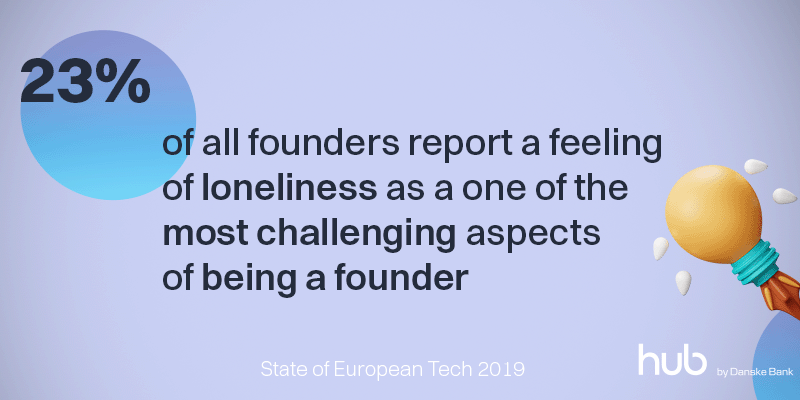
Which brings the question: who in their right mind would choose to be an entrepreneur? And do the pros outweigh the cons? The startup lifestyle may be tough, but it does have its benefits that in turn can build up resilience against possible mental health disorders: For one, startup founders do most often enjoy a sense of control and autonomy over their work. They can set their priorities and schedules. Startup life also comes with a vast possibility for social participation and social support in the often tight-knit startup communities. Moreover, startup founders have a unique opportunity for personal and professional growth, as well as cultivating happiness by meaningfully contributing to the wider society and world through their innovations and inventions.
5 Ways Founders Can Protect Their Mental Health
As shown previously, the life of a startup founder can, hence, be a double-ended sword. At once, it can become overwhelming and stressful. Whilst, on the other hand, it can truly make one’s quality of life so much better.
In this section, we will introduce five key ways to protect your mental health and easy ways to get started.
1. Embrace Meditation
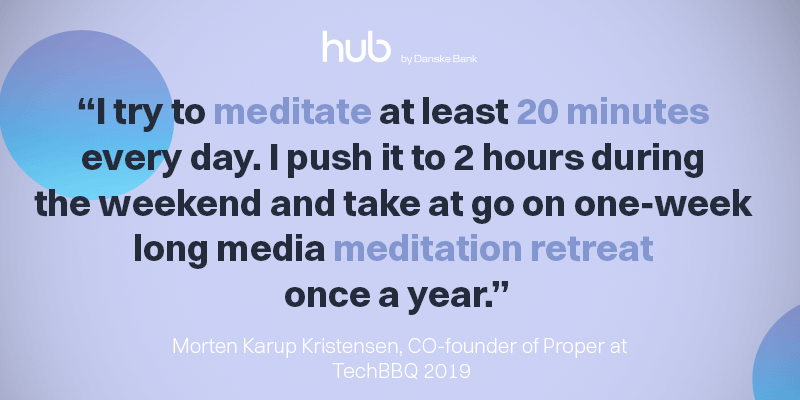
Meditating for a few minutes to hours a day has proven health benefits such as reduced stress, and controlled levels of anxiety. It is no wonder that everyone from Jack Dorsey to Padmasree Warrior takes time to do it daily. Even the founder of Able, Martin Bjergegaard, is a huge advocate for the power of meditation for their startup – (insert the new link)
💡How to Get Started: Use guided apps like Headspace, Calm or Ten Percent Happier. It only takes 10 minutes a day, and you can increase it up to how long suits you. Or if you require something a little more social, get started in a meditation studio like Kadampa Meditation Center in Copenhagen, Urban OM in Stockholm, Art of Living in Oslo or Purna Yoga in Helsinki.
2. Detach from Tech
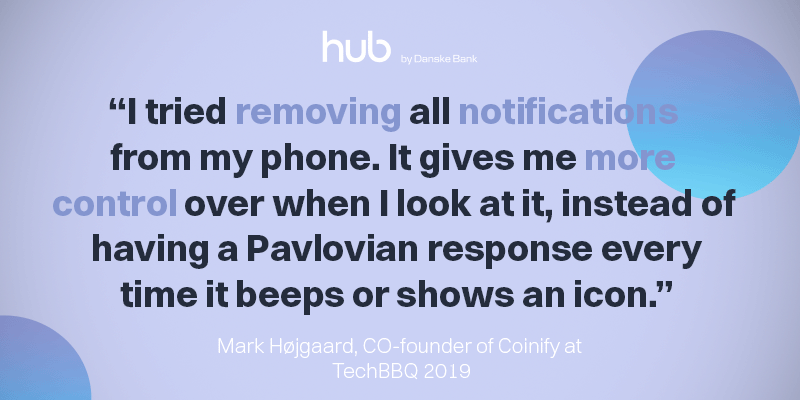
The tech journalist Stewart Rogers, whose keynote speech at TechChill 2019 What is Going Wrong With Mental Illness In The Tech Industry recommends spending more time in a natural environment. He’s not the only one: some doctors in Scotland now prescribe “a walk in nature” as a way to deal with anxiety associated with our digital world.
💡How to Get Started: There are more and more configurable phone settings designed to let you unplug. For instance, we’d recommend apps like Forest and Siempo. Set up specific “do not no disturb” times every day e.g. for the first two hours after waking up and two hours before bedtime.
3. Physical Activity
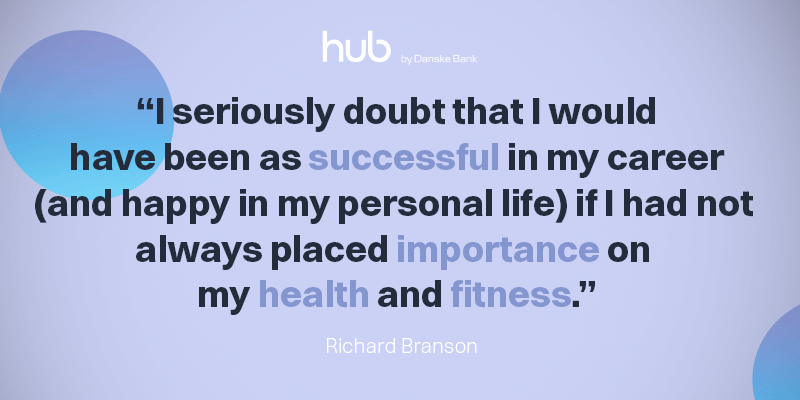
There is no shortage of studies on the positive benefits of exercise for mental health. Depression, anxiety, and stress: can all be eased with a regular dose of physical activity. Only 30 minutes of exercise a day may be enough to finish your body’s natural stress-response cycle.
💡How to Get Started: Start with a gentle jog with your favourite podcast, take a stroll up and down the staircase before a big meeting or simply have a ten-minute solo dance party to end the day. For techies, we recommend apps like SworkIt, Nike + Training Club and Charity Miles.
4. Follow “Out-of-Work” Passions
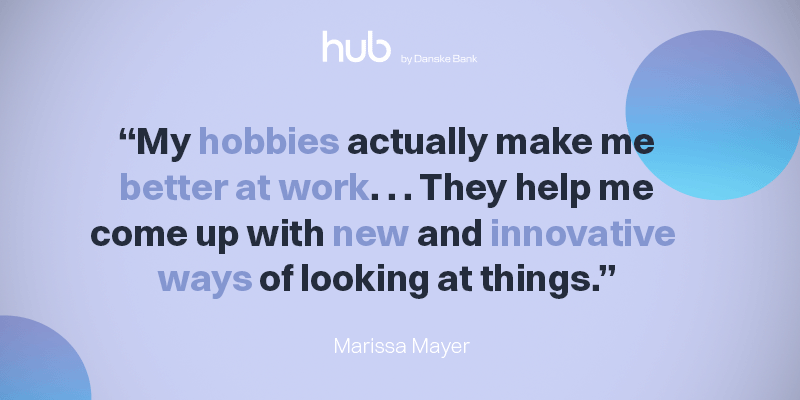
Following hobbies that are separated from your career can help give you breathing space, improve your happiness, unplug, and even focus more on your work when the right time comes. Just look at Peter Thiel who takes time to surf, Warren Buffet who plays the ukulele or Marissa Mayer who loves to bake. What’s your way of unwinding?
💡How to Get Started: If you struggle to find a hobby, think about what made you happy when you were a kid and align that with something you could do now. Drawing, photography and painting are all great examples to get started with.
5. Stay Social and Open Up About Your Emotions
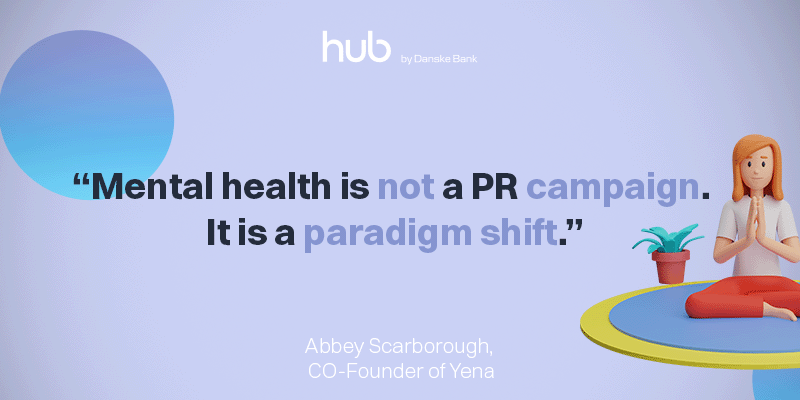
Bréne Brown’s TED talk Dare to Lead is slowly but surely helping people see how vulnerability can be a strength. This is true both in life and in business, and there is now a movement to fight the stigma associated with mental health, simply by opening up about it.
How people react to you opening up could surprise you. When Mark Højgaard, Co-Founder of Coinify opened up to his board about mental issues, the chairman completely understood. He even suggested he took time off to recuperate.
💡How to Get Started: Clear your schedule weekly to call family and friends. Have a coffee (or fika) regularly. Or, if discussing your feelings seems intimidating, consider starting easy by writing letters to others – or just for yourself.
Key Takeaways
Perhaps one of the most impactful quotes about an entrepreneur’s mental health comes from the late Aaron Swartz: “I feel ashamed to have an illness. It sounds absurd, but there still is an enormous stigma around being sick. I don’t want to use being ill as an excuse. (…) My friends are amazed by this; why is such a curious person so uncurious about the things so directly affecting his life?” A way to battle the possible risk factors to mental health is for us the founders, investors and startup supporters to get as curious about our mental health as we are about market trends and new technological solutions.
